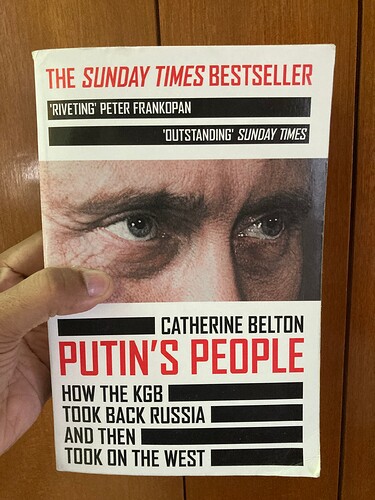Putin’s People, Catherine Belton, 2020 – All of us probably understand Russia at some level but am certain we all live with lot of gaps in that understanding. This book covers those, especially what happened just before and after the fall of the Soviet Union, the Yeltsin era, Putin’s rise and everything after.
The fall of the Soviet Union was chaotic, with Yeltsin taking the reigns from the Communist Party after banning it, amidst food shortages and hyperinflation. Yeltsin was a liberal and wanted to privatize property and be democratic and more liberally integrated with the global economy. Putin ran illegals in East Germany before the fall of the wall and was a KGB agent who liaised with the Stasi. He even had a Stasi id. KGB men were trained in subterfuge to serve the party’s interests.
Yeltsin’s govt. gave control to large amounts of resources to their family and friends in the name of privatization and lot of them became overnight billionaires and Oligarchs as the Soviet Union was falling. KGB in the meantime, siphoned as much cash as it could to foreign shores. Putin, (then 39 was deputy to the mayor) and his KGB men took control of St. Petersburg port along with the mafia (Tambov group) and its oil and gas terminals and ran it like their own fiefdom.
When the profligacy ended with Russia’s default in 1998, Putin moved to Moscow from St. Petersberg and rose through the ranks very quickly. Yeltsin govt. and family had been caught in a lot of scam and scandal and needed a safe way out and thought Putin could be the one who could be their puppet and installed him as president. Putin was reluctant to take over the position and thought he would be an interim president. KGB planned apartment bombings in Russia and killed their own citizens and planted the blame on Chechen rebels. This helped Putin’s ratings and his rise in his first term.
Putin though struggled to rule as he was not good at handling sensitive situations. KGB men slowly took over key positions and went after the Yeltsin era oligarchs, leaving just Yeltsin and family alone. Slowly all of Russia’s key wealth was transferred to KGB men and Putin and billions were siphoned out of Russia through offshore accounts in tax havens. The state’s money became KGB’s slush fund with which they could do whatever they chose.
Khodorkovsky was one of the oligarchs who stood up to Putin and Putin did not like being challenged and used the law and media (Which were forcefully taken over by KGB men from the oligarchs) to put him behind bars and take over his extensive wealth. With the courts and media in his control, Putin could literally do anything and control public opinion. As long as people had their TV, cars and refrigerator and were left alone, he could do as he pleased and had public support.
He finished his two terms and had to step down. There was an interim puppet president but Putin still ruled behind the scenes and came back for his third term, this time with imperial ambitions. He was tired of the game the west was playing in Europe, taking over ex Soviet countries into NATO’s fold. He also did not like the disinformation campaigns run by Western media on Russia – so he decided to do just the same with the KGB slush funds influencing elections in a lot of countries (The Orthodox church was a cover for his imperial aims), including Czech, Ukraine, France, Germany and even the US, with Trump who connections with Russia are detailed in depth in the last chapter.
Putin always felt Ukraine was a part of Russia and annexed Crimea and influenced the govt. in power. When a pro-West govt. was elected, he had often threated to cut down on oil and gas supplies and play with pricing. None of what is happening now is new and has all happened in some sense or the other pre-2020.
That in a gist, is what the book is. The author thinks the KGB never came out of its Cold war mindset, but to me it sounds like the author, the CIA and the west haven’t either and that is the crux of the problem with the world today. This is a great book to view the West’s viewpoint of Russia. Very highly recommended if interested in geopolitics. 10/10
| Subscribe To Our Free Newsletter |


